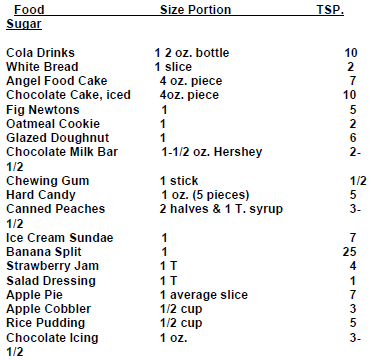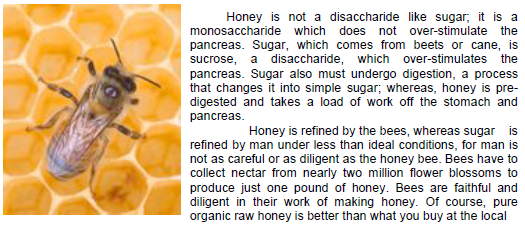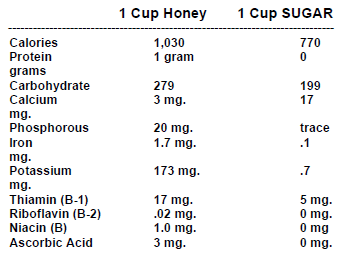SOME HIDDEN SOURCES OF SUGAR

(Taken from American Foundation for Medical-Dental Science, Los Angeles, California)
WHAT ABOUT HONEY?

grocery store. Raw honey will in a short time crystallize because it has not been heated to a high temperature and had all the enzymes destroyed. Honey also has more vitamins and minerals than sugar. (See chart for comparison)

America has become addicted to sugar. The average per person consumption in the U.S. is almost 135 pounds a year! Americans may be thought of as meat and potato eaters, but the average per person consumption of red meat is only 111 pounds per year, and of potatoes only 123 pounds per year.
Increasingly more Americans, however, are becoming aware of the danger in sugar consumption; and for some time now, the public has been exploring sweet alternatives. How safe are these artificial sweeteners? We are all familiar with the fact that some of these artificial sweeteners have been associated with cancer. I will merely give current information on one of these sweeteners.
SWEETENER LINKED TO CONFUSION AND MEMORY LOSS
Aspartame, the artificial sweetener widely used in diet soda and food, may cause confusion and memory loss in some people. This finding came from a study of 551 people who had severe reactions to aspartame, which is marketed under the brand name of NutraSweet. HJ. Roberts, director of the Palm Beach Institute for Medical Research in Florida, found that 157 of the participants had major problems. Eleven lost vision in one or both eyes; one-third suffered from severe dizziness; half reported severe headaches. One 18 year-old male, who drank about two quarts of aspartame-sweetened diet soda daily, could not find his way home in his own neighborhood. Severe reactions to the sweetener occurred three times more often in women. Although the Food and Drug Administration has received hundreds of complaints about aspartame from consumers, no adequate studies have been conducted. (New Scientist, 2/18/88).
WHAT CAN WE USE THEN INSTEAD OF SUGAR?
Use natural sugar just as the Good Lord put it in the food, such as fresh peaches, strawberries, cherries, watermelon, etc. A more concentrated natural sugar would be found in dates, figs, raisins, dried fruits, honey, etc.






